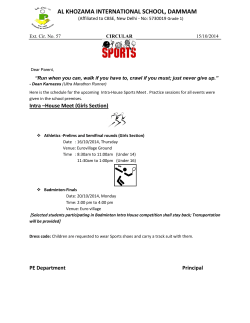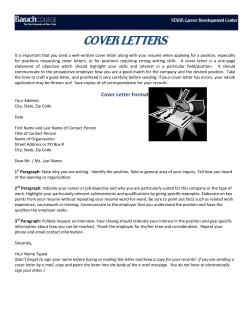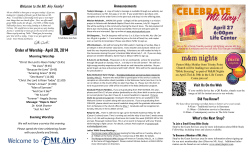
Event Management It’s not rocket science! © Jeannette Allison March 2009
Event Management It’s not rocket science! © Jeannette Allison March 2009 Taking the fear out of organising Successful events every time So where do we start? © Jeannette Allison March 2009 The event What is the purpose of the event What do you want to achieve Who is your target audience. © Jeannette Allison March 2009 Event timetable Make a checklist Include dates for completion of task. © Jeannette Allison March 2009 Event timetable/checklist NACO Annual Conference 2009 Organising Committee Mtg Venue inspection visit Accommodation inspection Book Venue Book Accommodation Organising Committee Mtg Invite speakers/guests Prepare Budget Budget approved Prepare Conference Programme & Registration Form Book entertainment Book photographer Programme & Reg Form to Printers Mailshot Conference Programme Return date: Registration Forms (6 wks prior) Prepare joining instructions Prepare final Programme Final Programme to printers Mail joining instructions (3 wks prior) with attendance list Printing of speakers name boards Prepare table plans etc Press Release Attend event March 2008 March 2008 March 2008 April April May May May August September 2nd wk January 1st wk February 5/6 March The Venue Where? What type of venue? When? CARDINAL RULE – Never book a venue without an inspection visit! © Jeannette Allison March 2009 Venue checklist Correct combination of rooms Accompanying exhibition required Obtain maximum capacity numbers What style of seating is required © Jeannette Allison March 2009 Venue checklist Is a stage necessary – location Does the main room have any obstructing pillars etc Does the main room have an induction loop system © Jeannette Allison March 2009 Venue checklist Is there natural light/will the room blackout How noisy is the heating/air con Does the venue have a dedicated co-ordinator who can assist with arrangements © Jeannette Allison March 2009 Venue checklist What audio visual equipment is needed Is there an adequate PA system Is there good access for disabled delegates. © Jeannette Allison March 2009 Booking the venue Meet with the conference co-ordinator Obtain room hire rates – negotiable! Conference venue – daily delegate rate Check cancellation fees Venue schedule. © Jeannette Allison March 2009 Overnight accommodation If accommodation needed, is it important for all delegates to remain in one location If using several hotels, is travel to main venue required Single or twin rooms © Jeannette Allison March 2009 Overnight accommodation INSPECT all accommodation Checklist Check latest release dates without incurring cancellation fees. © Jeannette Allison March 2009 The budget Anticipated number of delegates Is the event to break-even or profit desired Is sponsorship to be sought Always allow a ‘contingency’ Be REALISTIC. © Jeannette Allison March 2009 Anticipated No. of delegates 100 Projected £ General Event: Printing Preliminary Programme & Reg Form Conference Programme Menu cards Speakers name boards Stationery Name badges Delegate Wallets Entertainment After dinner Band Caricature Artist Photographer Flowers Speakers’ expenses Fees Travel Overnight accom Audio visual hire Conference Office expenses (travel, accommodation & catering) Total General Contingency 15% TOTAL GENERAL £250.00 £500.00 £60.00 £45.00 £80.00 £150.00 £500.00 £100.00 £95.00 £150.00 £1,200.00 £450.00 £720.00 £780.00 £550.00 £5,630.00 £844.50 £6,474.50 Actual £ Projected £ INDIVIDUAL DELEGATE COSTS: Daily delegate rate x 2 days @ £32.00 Drinks reception & Gala dinner @ £45.00 Overnight accommodation Single room @ £85.00 £6,400.00 £4,500.00 £8,500.00 TOTAL DELEGATE TOTAL GENERAL £19,400.00 £6,474.50 TOTAL £25,874.50 Based on 100 delegates £258.74 Actual £ Sponsorship Who to approach Sponsorship packages Level of publicity at event. © Jeannette Allison March 2009 Invitation to speakers/official guests Seek commitment as soon as possible Are speakers’ fees/expenses payable Send ADV form. © Jeannette Allison March 2009 SPEAKERS’ ADV FORM - Return by (date) Full Name ___________________________________________ Title Mr/Mrs/Ms _______ Company/organisation ______________________________________________________ Address _________________________________________________________________ Tel: Office ________________ Mobile _______________ E:mail_____________________ Title of your talk ___________________________________________________ Brief synopsis (please provide a brief synopsis of your talk for publication) ___________________________________________________________ ___________________________________________________________ ___________________________________________________________ ___________________________________________________________ Biographical details (please provide a brief biography for publication) Audio Visual Equipment (please indicate your requirements) Interactive whiteboard Standard whiteboard OHP Projector Other equipment? Multimedia projector DVD player Flipchart Signed _______________________________ Date ___________________ Conference Programme Decide whether preliminary or final programme What to include CARDINAL RULE – proof read thoroughly! © Jeannette Allison March 2009 Registration Form Include to whom the form is to be returned to with contact information Include the closing date for receipt – 6 weeks prior to event Include request for special requirements – dietary/disabled access/help in an emergency. © Jeannette Allison March 2009 Joining Instructions 3 weeks prior to event Include Registration Card Final materials and attendance list. © Jeannette Allison March 2009 Organising an Exhibition As with Conferences, establish objectives of exhibition and identify exhibitors If alongside conference, ensure tea/coffee/lunch and/or other events are integrated into the exhibition space Follow up initial mailshot with telesales call © Jeannette Allison March 2009 Organising an Exhibition Produce an Exhibitors manual for hire of shell extras, furniture, flowers etc Always produce an Exhibitors showguide Always tie-in exhibition arrangements within conference programme Complete a Risk Assessment © Jeannette Allison March 2009 At the event Arrive at least the day before Meet key organising personnel Establish first aid contact Complete final risk assessment Ensure registration desk in prime location If something goes wrong: DON’T PANIC! © Jeannette Allison March 2009 Assessing failure or success Evaluation form At the event or sent out separately. © Jeannette Allison March 2009 EVALUATION FORM Your feedback is essential to monitor the effectiveness of our events. Name: Company: Conference: Workshop(s) WorkshopEvent: attended: Score How would you rate the content and relevance of today’s Conference? (Excellent = 4 Very Good =3 Good = 2 Poor = 1) ... Comments: What could be done, if anything, to improve the quality of today’s workshop? (consider timing and duration, location and environment) Score How would you rate your Workshop Leader in the following key areas? (Excellent = 4 Very Good =3 Good = 2 Poor = 1) Made you feel comfortable and at ease Communicated well and provided clear and concise instructions ... ... ... Encouraged questions and feedback Knowledgeable about subject matter ... How would you rate the Conference materials in terms of: (Excellent = 4 Very Good =3 Good = 2 Poor = 1) Quality ... Suitability as post-event support ... Have your personal objectives for attending this event been met? (Yes = 3 Mostly = 2 No = 1) If not, why not? Thank you for completing this form. What organising nightmares have you experienced and in hindsight what would you have done differently? © Jeannette Allison March 2009 Press Releases Decide if you want to prepare one Decide on target audience How will it be distributed. © Jeannette Allison March 2009 How to write a press release Keep it short & sweet – max 2xA4 sides Decide for immediate release or to be embargoed Must include the 5 ‘W’s – who, what, when, where, why and then how. © Jeannette Allison March 2009 PRESS RELEASE TEMPLATE (logo) PRESS RELEASE Issued: (date) For Immediate Release OR Embargoed Until: (date/time) TITLE (make it brief and attention grabbing) The first paragraph should be a summary of the story – including Who, What, When, Where. Expand on the details in the next paragraph using Why and How. Remember: the journalist will want to know what is unique or new about the story and why it will appeal to their readers. Then back up your claims with facts and statistics. Follow up your story with quotes in italics, if required. This will bring the story to life. Finish off with details such as dates, times, prices and how to contact you. ## Ends ## Notes to editors 1. 2. 3. 4. 5. Tell the editor who to contact for more information – incl. mobile, landline and e:mail Also include short background information on your organisation Include company name, fax number, e:mail and website info Include opening hours, prices, venues, dates as appropriate You should also state whether you have photos available Dealing with media interest If the media are interested in your story, they will contact you as organiser first Always protect your guest/speaker Check with him/her to see if they are happy to give an interview Schedule with journalist at a convenient time. © Jeannette Allison March 2009 Risk Assessments The safety of your delegates/guests is paramount – reason enough to prepare one! It’s a careful examination of what could cause harm to people, allowing you to assess if you have taken enough precautions or should do more to prevent harm. Its being prepared! © Jeannette Allison March 2009 Preparing a Risk Assessment The 5 steps are: Identify the hazard Decide who might be harmed Evaluate risks & decide on precaution Record your findings Review assessment & update if necessary © Jeannette Allison March 2009 What could go wrong at your event and how would you deal with it? © Jeannette Allison March 2009 Health & Safety Issues Knowing your delegates/guests Having access to venue first aider or consider your own training Knowing the venue emergency evacuation procedure & alarm Consider making a ‘formal’ announcement at the opening of your event. © Jeannette Allison March 2009 What health & safety issues affect the events you organise? © Jeannette Allison March 2009 Need more help / training Event Management – ACE – Association of Conference Executives AEME – Association for Event Management Education © Jeannette Allison March 2009 Need more help / training Risk Assessments – Health & Safety Executive Press & Media Relations – The Press Association © Jeannette Allison March 2009 What have we learnt today? In short – Never underestimate the task ahead Plan, plan, plan Maintain good effective working relationships – you can’t do it alone! © Jeannette Allison March 2009 What have we learnt today? Proof read everything Never assume anything Always be prepared! © Jeannette Allison March 2009 Thank you and good luck with your event organising © Jeannette Allison March 2009
© Copyright 2025









